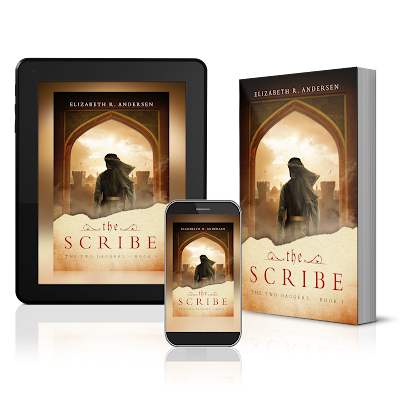"Henri
stood as tall as Rogier, green-eyed, and brown-skinned, and seventeen years
old. The other young nobles of Acre
chafed that Henri had riches, status, and the favor of every woman who crossed
his path, and the city leadership rolled their eyes at his aloof attitude
towards his civic duties as a member of the noble class. Aware of his good looks, he frequently wore a
mocking smile that enraged every older man in his presence with its implied
insolence. He was the kind of youth that
filled men with the desire to hit him in the face, even if he committed no
crime."
~ The Scribe
We
have all met someone like Henri of Maron, the main point of view character in The
Two Daggers series. Proud, arrogant,
and indulged with everything he's ever wanted, he has wealth, good looks, and
high social status. Why would anyone
want to read a book about someone this obnoxious? I certainly would not…unless I suspected that
he would learn to find his humanity as the series progressed, and not the easy
way, either.
The
Two Daggers
series is about personal journeys. The
four primary characters live their lives on the pages, and we follow them as
they experience loss, achievements, change of heart, and revenge. And all of this happens before the trials of
war even begin. But let me back up a
bit.
Book
one in the series is about the months leading up to the demise of the city of
Acre in the 13th century, which is located in present-day Israel. A quick internet search will reveal the
gruesome details. The city was besieged
and then utterly devastated by the Islamic Mamluk army, who were trying to
eliminate the threat of the Crusaders joining forces with the Mongol troops in
the north. The sultan leading the attack
did not want to give the Christians a way to regain a foothold in the Levant,
so he had his soldiers fill the harbor at Acre with debris and pull down as
many buildings as possible. The siege
marked the end of the Christian crusades in the Levant and the beginning of
some deep soul searching in the West.
When
the city fell, thousands were left homeless. The wealthiest citizens were able to get out
early on ships, but the poor were heartlessly abandoned to face the attacking
army. Most who escaped sailed to the
nearby island of Cyprus, and from there, some continued to their ancestral
homes in Frankish territories, Francia, the Italian peninsula, or beyond. Others were less fortunate and remained in
Cyprus, living in the streets, their eyes always turned toward the east, where
their city smoldered for weeks. The Cypriot
village of Famagusta swelled after Acre fell, transforming into a metropolis in
order to accommodate the crowds of refugees. In the middle of all this, I've placed three
teenagers and one Mamluk amir.
Everything
about the four main characters seems completely unrelated, but they are all
tied together by their common search for themselves as they come of age in a
socially complicated time in the Middle East. We journey with Emre as he is kidnapped,
enslaved, runs away, and becomes enslaved again. We are with Henri of Maron as he makes
disastrous decisions that have severe consequences for himself and his family. We watch with apprehension as Sidika learns to
find her courage in a society that will not allow her to use her immense
talents. And we follow Yusuf as he walks
alongside his leaders, following orders unquestioningly until the actions of
those around him cause him to question his beliefs and his friendships.
The
Scribe
ends on a steep cliffhanger but picks up immediately where it left off in book
two, The Land of God, which details the actual Siege of Acre and the
moment when this place, spiritually significant for the three Abrahamic
religions, consolidates. The series is
planned for five books, during which time the characters attempt to put their
lives together after the end of the crusades. Journeying by sea and on land, by horse and
camel, on foot and sometimes against their will, their paths all crisscross
together, and they leave their marks (and scars) on each other. If you choose to follow Henri, Emre, Sidika,
and Yusuf on this adventure through Medieval Palestine, buckle up; it is an
emotional, often gritty journey, but well worth the trip to see how people
lived their lives before the Renaissance.
 |
The Scribe (The Two Daggers, Book 1) By Elizabeth R. Andersen |
All Henri of Maron wanted was to stay with his family on his country estate, surrounded by lemon groves and safety. But in 13th century Palestine, when noble-born boys are raised to fight for the Holy Land, young Henri will be sent to live and train among men who hate him for what he is: a French nobleman of an Arab mother. Robbed of his humanity and steeped in cruelty, his encounters with a slave soldier, a former pickpocket, and a kindly scribe will force Henri to confront his own beliefs and behaviors. Will Henri maintain the status quo in order to fit into a society that doesn’t want him, or will fate intervene first?
The first book in The Two Daggers series, The Scribe takes readers on a sweeping adventure through the years and months that lead up to the infamous Siege of Acre in 1291 CE and delves into the psyches of three young people caught up in the wave of history.


































